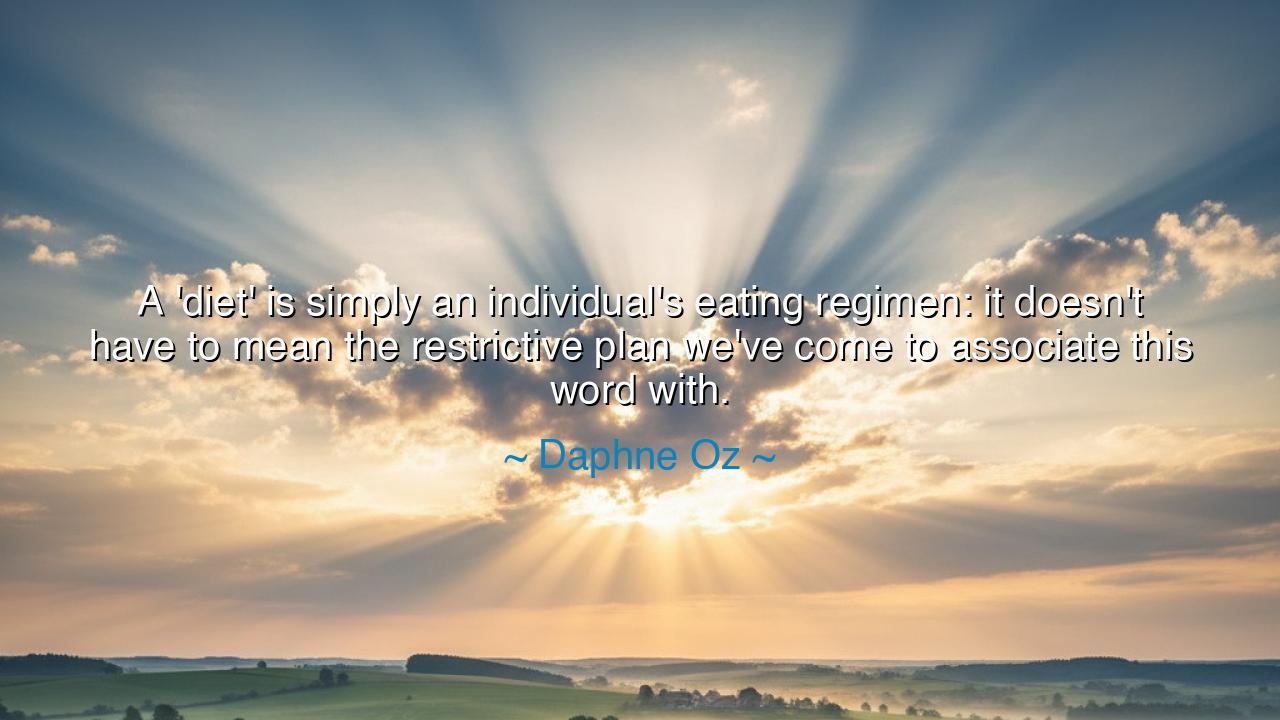
A 'diet' is simply an individual's eating regimen: it doesn't
A 'diet' is simply an individual's eating regimen: it doesn't have to mean the restrictive plan we've come to associate this word with.






"A 'diet' is simply an individual's eating regimen: it doesn't have to mean the restrictive plan we've come to associate this word with." – Daphne Oz
In these wise and measured words, Daphne Oz restores purity to meaning. She reminds us that the word “diet”, so often wielded as a weapon of guilt and deprivation, was once a word of balance, rhythm, and life. In the ancient tongue, diaita—the Greek root of our modern term—meant not a set of rules or restrictions, but a way of living, a manner of being in harmony with nature and self. The ancients did not separate food from the spirit, nor the table from the heart. To them, to live well was to eat with gratitude and moderation, to nourish the body as one nourishes the soul. Daphne Oz, in her gentle yet profound way, calls us back to this original wisdom—to see the diet not as a punishment, but as a practice of alignment.
For centuries, people have chased after perfection through the tyranny of rules—measuring, denying, counting, and fearing. The modern world has turned diet into a form of penance, a ritual of unworthiness. Yet Oz breaks through this illusion. She reminds us that our eating regimen is not meant to be a cage, but a mirror—reflecting who we are, how we live, and what we honor. In her words, there is freedom. For when one understands that a diet is simply the way one eats, the act of nourishment becomes sacred again—an opportunity to express love, wisdom, and care toward one’s own being.
The ancients lived by this philosophy. The Roman physician Galen, who tended to emperors and gladiators alike, once said that the path to health lay not in excess or denial, but in balance. He prescribed no starvation, no feasting, but instead urged his patients to eat in accord with their constitution, their work, and the season of the year. “Let each man know himself,” he said, “and he shall know how to eat.” Daphne Oz speaks from this same lineage of truth. Her teaching is not about rules to obey, but about self-awareness—the quiet art of listening to one’s own body, learning its needs, and responding with wisdom rather than fear.
In every age, humanity has sought to control the body as if it were an enemy. But the body is not a foe to be conquered—it is the temple through which life speaks. When Daphne says that a diet “doesn’t have to mean the restrictive plan we’ve come to associate with this word,” she is urging us to abandon the old warfare between desire and discipline. She teaches that the body does not need punishment to thrive; it needs understanding. The right diet is not one written in books or shouted by strangers—it is written in the pulse of our own lives, revealed through patience and reflection.
Consider the story of Pythagoras, the philosopher who taught that the soul could not reach harmony unless the body was kept in order. He did not demand his students follow one rigid path; instead, he taught them to live in harmony with the cosmos through food, rest, and thought. His “diet” was not merely what one ate, but how one lived—how one spoke, breathed, and treated the earth. Daphne Oz, in echoing this wisdom, reclaims the word from the marketplace of trends and restores it to its rightful place: a philosophy of living well.
To live by her teaching is to practice mindfulness in every meal. Eat not to flee hunger, nor to fill emptiness, but to nourish and sustain. Recognize that what you consume becomes part of you—not just in flesh, but in spirit. When you eat, ask not, “Will this make me thin?” but rather, “Will this make me whole?” Let your choices arise from care, not fear; from gratitude, not guilt. In this way, your diet becomes an act of devotion—a daily expression of self-respect and reverence for life.
The lesson, then, is both simple and profound: reclaim the true meaning of diet. See it not as a commandment of denial, but as the art of harmony between hunger and health, between body and being. Do not follow fads; follow awareness. Eat in a way that strengthens, delights, and sustains you. Let your meals be a ritual of balance—a chance to remember that nourishment is the foundation of wisdom.
So let these words be passed down: the diet is not a punishment, but a path. It is the rhythm of your days, the melody of your choices, the quiet partnership between body and spirit. As Daphne Oz teaches, to eat wisely is not to restrict, but to remember—to live in alignment with the essence of who you are. And in that remembrance lies not only health, but peace.






AAdministratorAdministrator
Welcome, honored guests. Please leave a comment, we will respond soon